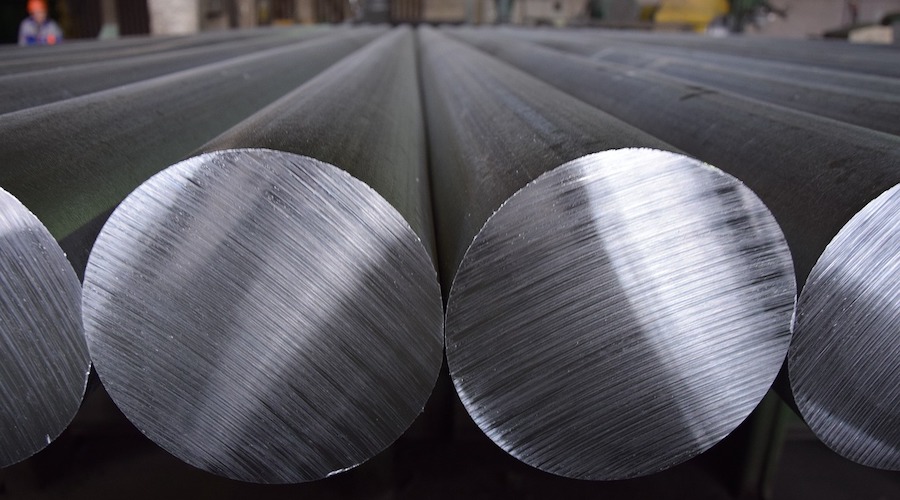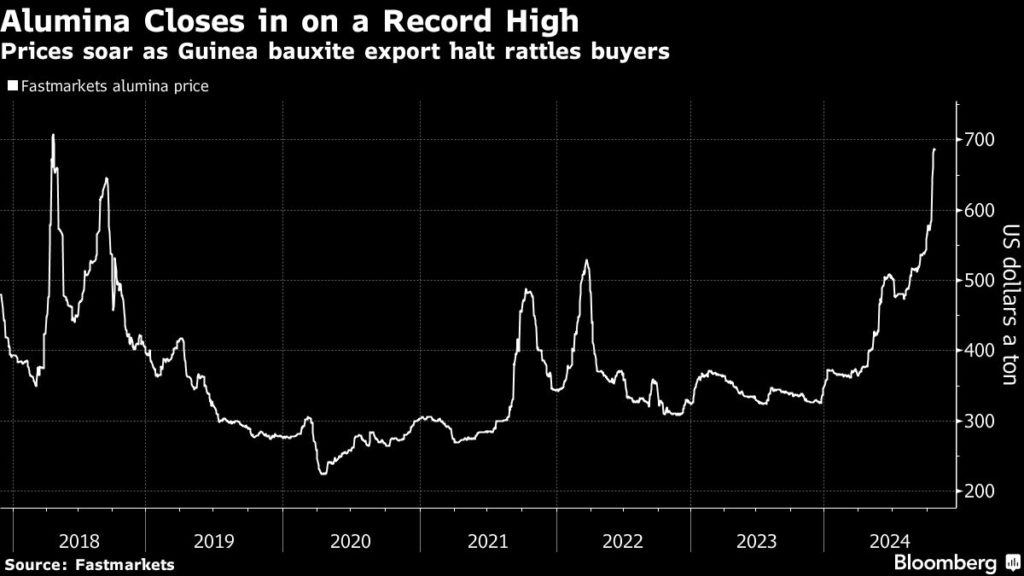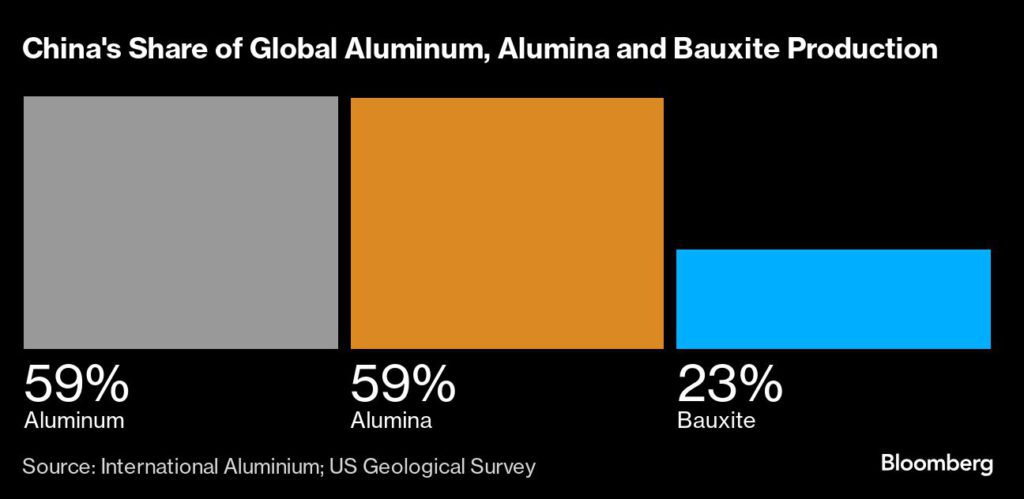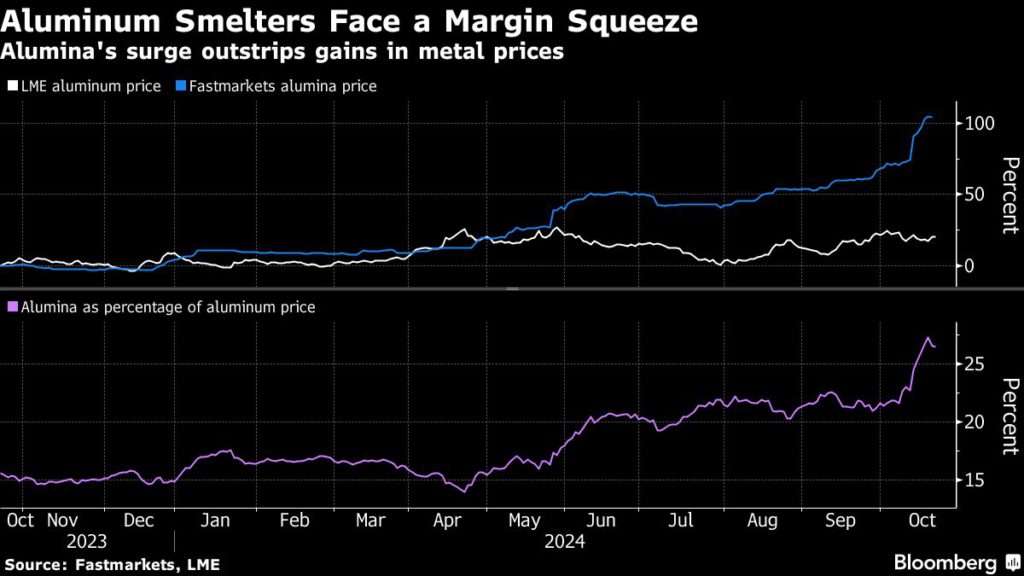
The key raw material needed to make aluminum is tearing toward a record high as buyers race to secure supplies, following an export disruption in top-miner Guinea that has rippled through to China.
Prices for alumina have surged by more than 20% so far this month and are now within striking distance of the record of $707.75 set in 2018, according to pricing agency Fastmarkets Ltd.
The rally has been building all year due to a string of disruptions along the sprawling global supply chain, from Australia to Jamaica. To make aluminum, raw ores known as bauxite are refined into alumina, which is then smelted into pure metal. The latest shock came earlier this month, when Guinea blocked Emirates Global Aluminium’s bauxite exports, sowing panic among buyers who are now scrambling to snap up alumina supplies.
As a result, the aluminum industry in China — the world’s biggest producer of the metal used in everything from drink cans to airplane parts — is coming under strain. China relies heavily on Guinea for bauxite, and smelters are being squeezed as alumina costs soar while prices for the finished product haven’t risen as quickly.
In the worst-case scenario, aluminum smelters could need to curtail production to limit losses, tightening metal supplies and underpinning a rally in aluminum prices. Analysts are hopeful that alumina output will rebound before that happens, but conditions on the ground are deteriorating fast.
Chinese port inventories of alumina have plunged to the lowest levels since at least 2015. With spot cargoes disappearing fast, traders and smelters have been approaching other sellers in western markets that they don’t usually buy from, according to people familiar with the matter. In some cases buyers are queuing up outside alumina plants, according to industry researcher Mysteel Global.
Trading in alumina futures has surged in Shanghai, bringing in a new cohort of eager buyers as smelters and physical traders dash to obtain dwindling supplies.
“For months, the market has been one accident or event away from a major price move,” Duncan Hobbs, head of research at metals trading house Concord Resources Ltd., said by phone. “The Guinea situation has provided the catalyst for another step-up in prices, and it sets the stage for a tighter market and a deeper deficit.”

The latest turmoil offers a fresh reminder that a handful of companies and countries have outsized influence in one of the world’s most ubiquitous metals.
A wave of Chinese investment in Guinea over the last decade has led to surge in bauxite production in the West African country. China’s industry — which produces about 60% of the world’s alumina and aluminum — now sources 70% of its import needs from the nation.
Concerns about Guinea’s dominance in bauxite rose to the fore during a coup in 2021. Since then, the nation’s ruling military junta has sought to leverage its mineral wealth by compelling miners to invest in alumina plants in-country as well.
“The export ban is likely to be somewhat of a shakedown of mining companies to both increase royalties on bauxite, and to accelerate investment in promised alumina refineries in Guinea,” BMO Capital Markets analysts Colin Hamilton and George Heppel said in an emailed note.

Emirates Global Aluminium signed a preliminary deal to build an alumina refinery in Guinea in June, working alongside Aluminium Corporation of China, commonly known as Chalco. But by building additional alumina refining capacity there, the companies could constrain bauxite supplies that would otherwise go to their existing alumina plants.
EGA is still seeking clarity on the exact reason for the stoppage, but it believes there’s no legal justification for the action based on its progress in developing the alumina refinery, the company said in an emailed statement. Colonel Kaba Camara, a spokesperson for Guinea’s General Directorate of Customs, declined to comment on the matter.
“This growing dependence on Guinea leaves room for market shocks,” Morgan Stanley analysts led by Amy Gower said in an emailed note. “While suspensions like this are often short-lived, it highlights the thin safety buffer in the bauxite market.”

The consensus among analysts is that recent disruptions in Australia and elsewhere will be resolved before smelters will need to start shutting down, particularly due to the hefty costs involved in doing so. But further disruptions shouldn’t be ruled out, according to Concord’s Hobbs.
“In the next 12 months the alumina market balance should ease significantly, and it’s hard not to take the fundamental position that prices will fall,” he said. “But the alumina market is starting from a much deeper deficit than appears popularly appreciated, so there will be more catch-up to do to make the market square again.”
Aluminum prices rose as much as 1.9% to $2,644 on the London Metal Exchange on Tuesday, while other metals were mixed.
Read More: China to extend record aluminum output amid ample power
Comments